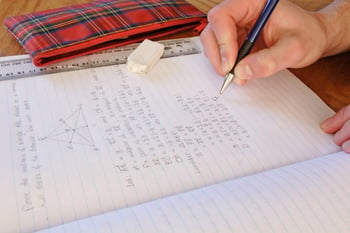Exams are a crucial part of every student's academic journey, marking milestones and shaping future endeavours. As a parent, witnessing your child navigate through the maze of exams can be a nerve-wracking experience. Here are some practical tips to help them maximise study sessions and achieve their academic goals.
Create a Positive Environment
Establish a conducive study environment at home. Ensure there are minimal distractions, adequate lighting, and comfortable seating arrangements. A calm and organised space can significantly enhance your child's concentration and productivity.
Revision Schedule
Start by creating a revision timetable. Sit down with your child to map out their school week and after-school activities and see where you can fit revision sessions around it. It’s important to be realistic and schedule regular breaks, and allow time for seeing their friends or their hobbies and extracurriculars. It’s much better to do manageable chunks of effective revision than hours and hours of ineffective revision.
Encourage Regular Breaks
While it's essential to dedicate sufficient time to revision, encourage your child to take regular breaks. A good rule of thumb is for every hour of study, schedule 15 minutes of breaks. Short breaks can help them recharge their energy and maintain focus. Suggest activities like stretching, taking a walk, or indulging in a quick snack to rejuvenate their mind.
Utilise Different Revision Methods
Experiment with various revision methods to find what works best. Every student’s brain works and learns differently, so some of these may work better for them than others.
There are lots of different techniques which include making mind maps, brain dump, watching educational videos, using colour-coordinated notes, colour associations with topics or online quizzes and interactive resources. Mixing up study techniques can keep things interesting and help reinforce learning.
Try Student and Teacher Role Reversal
Another effective revision technique is to swap roles and encourage your child to talk through their subject knowledge. By asking your child to explain a topic or subject to you, it helps them refresh their understanding of the subject. Make sure you listen and ask them questions if you don’t understand what they are explaining. Some studies have shown that one of the best ways to revise is by teaching others.

Practise Past Papers
One of the most effective ways to prepare for exams is by practising past papers or sample questions. Get your child to familiarise themselves with the format of the exam, the types of questions asked, and the time constraints.
Help Identify Their Weaker Subjects
Sometimes it is easier for your child to focus on their strong subjects because those are easier to manage, or they have more of an interest in them. Getting them to start on the subjects they feel less confident with not only gives them more time to get to grips with it but also enables them to get more help from their teachers on areas they struggle with.
Stay Organised
Keep study materials well-organised to avoid wasting time searching for notes or resources. Use folders, binders, or digital tools to categorise notes, textbooks, and revision aids. A clutter-free study space can also help minimise distractions and improve focus.
Finally, stay positive and help your child manage stress. Remember, exam revision is a marathon, not a sprint. By implementing these tips, you can play a pivotal role in supporting your child's exam revision journey. Your support and encouragement can make a world of difference in helping your child navigate through the challenges of exams and emerge victorious. Good luck!


.png)